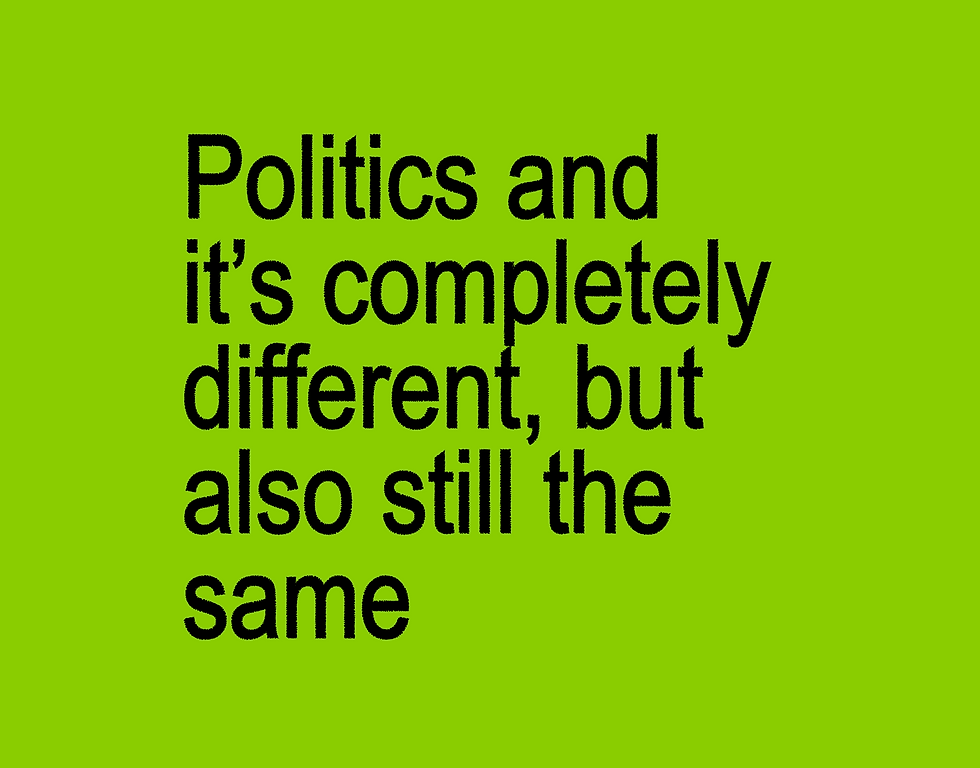Your Party, Kamala HQ, and the Pitfalls of Algorithm-centric Political Campaigning
- Gemma Gradwell

- Aug 12, 2025
- 3 min read
Updated: Aug 15, 2025

Charli XCX’s album ‘Brat’ has now seemingly become a political marketing staple on both sides of the Atlantic, along with Tiktok trends and AI imagery. Courting the youth vote is pushing political campaigning into overdrive – but to what end?
Coventry MP Zarah Sultana and former Labour party leader Jeremy Corbyn have joined forces to upset the political order with the announcement of their new political party, known for now as ‘Your Party’. More than 600,000 people have reportedly registered through its launch website as supporters. The party will face several more hurdles before the likelihood of electoral success can be meaningfully judged, not least curating an actual manifesto, but the outpour of support is not to be undermined.
Sultana alone, one of the youngest figures in politics at just 31, is the most followed British politician on Tiktok. Corbyn’s Labour leadership stint is perhaps most remembered for his hotly debated command of the youth vote in the 2017 election – the so-called ‘youthquake’. It is undeniable that the two have captured the hearts and minds of British youth - proving increasingly more important with the enfranchisement of 16 and 17 year olds - building upon the pre-existing popularity of left-wing ideals among younger people.
The new party’s launch is no exception. An unverified Tiktok page endorsing the party features popular sounds, AI imagery and bright graphics, leading it to secure almost 44,000 followers in under two weeks. For comparison, the Conservative’s page has existed since May 2024 and has around 142,000 followers, whilst Labour’s account has garnered 231,000 followers in roughly the same time period. The account goes as far as acknowledging its own marketing success, captioning one early post, “Call it AI, call it tactical marketing – whatever it is, you’re talking about it. Mission accomplished.”

Sultana and Corbyn’s social media accounts replicate this marketing style, commonly featuring Charli XCX’s song “party 4 u”. A video posted to his account of Corbyn singing along to its lyrics has garnered 1.1 million views. Those with an eye for political marketing will be experiencing a sense of déjà vu, recalling Kamala Harris’ ‘Brat’ rebrand in her 2024 presidential campaign. The now over-analysed campaign seized on popstar Charli XCX’s endorsement of Harris shortly after Joe Biden’s withdrawal from the race to the White House. Harris’ social media was renamed “Kamala HQ” and featured references to the album covers’ neon green square background and low-resolution font. Her social medias utilised edited clips and bold jokes in a clear attempt to appeal to the youth vote.
But as the political world remembers, Kamala Harris did not win the 2024 presidential election. And therein lies the cautionary tale. Relatable marketing, pop-culture references, and a curated down-to-earth persona do attract the youth, and undoubtedly capture attention. Policies and manifestos, however, still win votes. Social media engagement can be a false indicator of electoral success, as likes and views don’t necessarily come from eligible voters. Many felt that Harris’ stance on immigration and foreign policy issues were lacking, and that her campaign relied too heavily on soundbites and creative imagery whilst neglecting the creation of a real policy agenda.
Sultana and Corbyn are at a crossroads with their party and must walk a careful tightrope to electoral success. Perhaps they would do well to take inspiration from a different, successful campaign – that of New Labour. Whilst Cool Britannia pre-dated the rise of social media, many themes are the same. Riding the cultural wave through endorsement by relevant pop culture figures (Blur and Oasis), use of feel-good music (“Things can only get better”), focus on the relative youth of PM Tony Blair – all the themes are there. But the key is the execution. New Labour promised real, digestible change in the form of their five pledge card promises, focusing on key points of concern like education and healthcare. The campaign prioritised the concerns of the public at the time and overcame the inaccessibility and irrelevancy problem that many continue to level at the left.
New Labour’s campaign combined style and substance, regardless of what followed during their time in power. Sultana and Corbyn have demonstrated all the ingredients for success, and many on the left are optimistic about their chances. They must not forget what truly matters, however. The people of Britain care about the weeks they have to wait for a doctor’s appointment, rising energy prices, and increasing limits on freedom to protest far more than they care about whether their future prime minister knows about the latest Tiktok trend.
Illustartions by Will Allen/Europinion
.png)



Comments